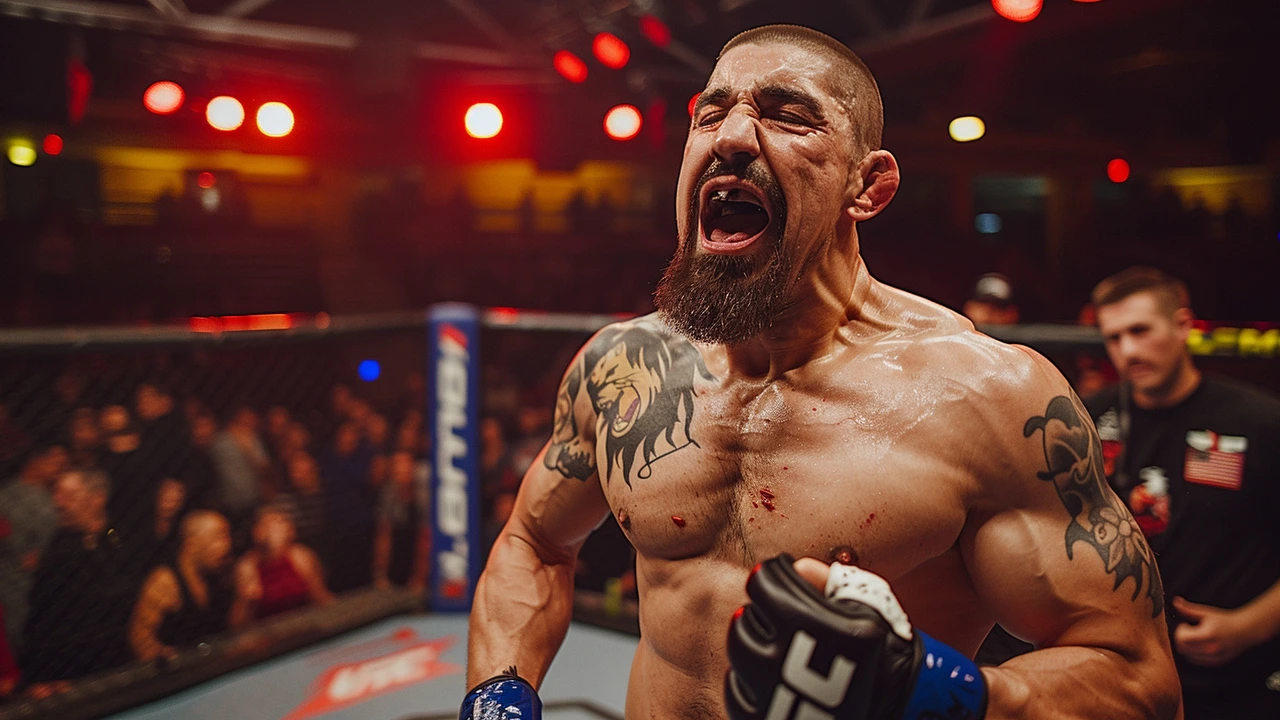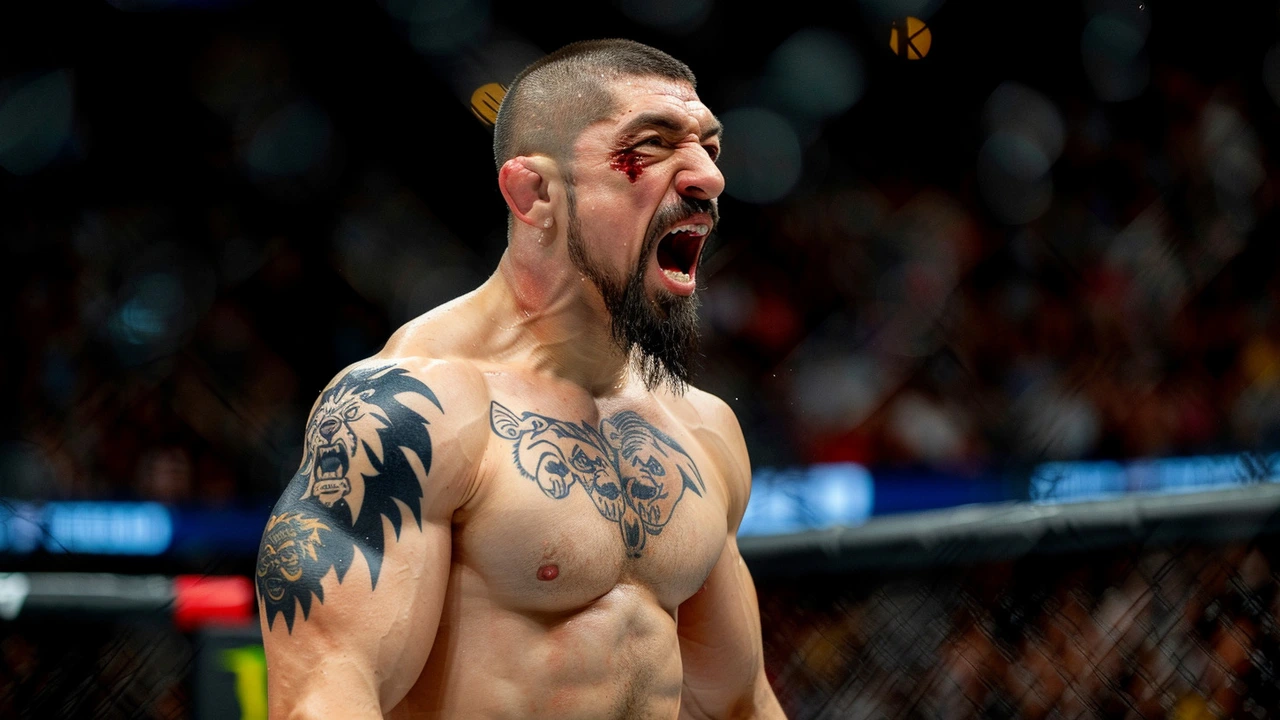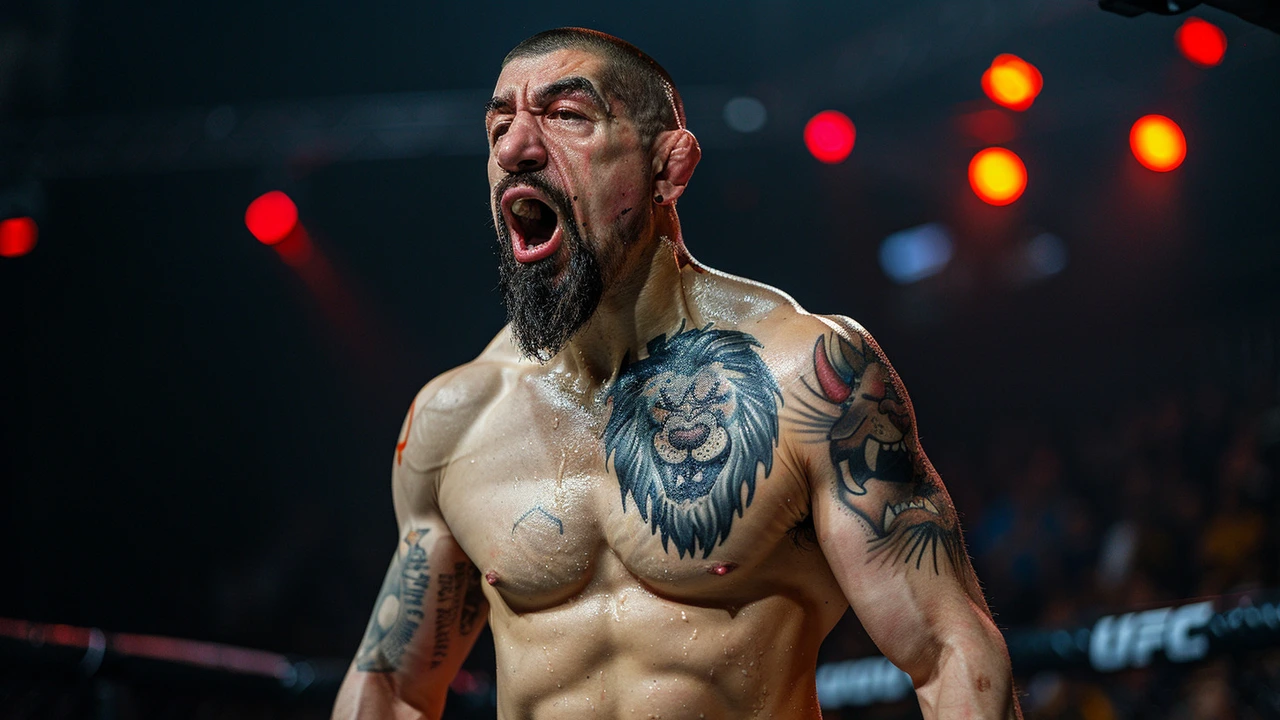UFC's Historic Night in Saudi Arabia
The Ultimate Fighting Championship (UFC) recently hosted a landmark event in Riyadh, Saudi Arabia, bringing a spectacle that captivated mixed martial arts fans worldwide. This event wasn't just about the fights; it symbolized a significant step in the UFC's expansion into new, diverse markets. The night was filled with dramatic victories, last-minute thrills, and the emergence of fresh talent ready to shake up the divisions.
Robert Whittaker Shines Despite Last-Minute Changes
The main event featured New Zealand's Robert Whittaker, who faced off against Ikram Aliskerov, a late replacement for Khamat Chimaev. Despite the abrupt opponent switch due to Chimaev's sudden bout of food poisoning, Whittaker exhibited remarkable composure and adaptability. He skillfully dismantled Aliskerov in what many describe as a masterclass in MMA technique.
Whittaker's performance was a testament to his preparation and mental fortitude. He delivered a calculated and relentless attack, leaving Aliskerov struggling to find footing throughout the fight. This victory reaffirms Whittaker's position as a top contender in the middleweight division. As the dust settles, Whittaker eyes future battles, potentially facing Sean Strickland, with hopeful anticipation for a shot at the title.
Aliskerov: A Promising Future
Although Ikram Aliskerov failed to secure a victory, his stepping up to the challenge on short notice was commendable. Aliskerov showcased flashes of brilliance and resilience that suggest a promising future within the division. His willingness to face a fighter of Whittaker's caliber demonstrates his potential and courage.
Aliskerov’s performance might not have earned him the win, but it certainly bought him respect in the eyes of fans and fellow fighters alike. Mentors and coaches will likely help him refine his skills further, with many anticipating his return to the octagon under better-prepared circumstances.

Alexander Volkov's Dominant Display
Another significant highlight of the night was the co-main event where Russia's Alexander Volkov took on Sergei Pavlovich. Volkov, aiming to solidify his stature in the heavyweight division, put on a display of superior technique and strategy. From the beginning, Volkov controlled the pace, employing his reach and striking power with precision. Pavlovich, though formidable, struggled to counter Volkov’s well-executed game plan.
Volkov's unanimous decision victory was more than just another win; it was a statement to the heavyweight division that he's a force to be reckoned with. This performance edges him closer to title contention, adding intrigue to the future matchups within this ever-competitive weight class.
Magomedov and Lima Steal the Spotlight
UFC Fight Night in Riyadh wasn’t solely about Whittaker and Volkov; new names proved their worth and secured their place among the must-watch fighters. Shara Magomedov delivered a breathtaking performance, earning him a Performance of the Night bonus. Magomedov's swift and tactical victory had fans and critics buzzing about his future in the sport.
Similarly, Felipe Lima erupted into the spotlight with a dominating performance, which also earned him a Performance of the Night bonus. These rising stars not only showcased their immense talent but also indicated a bright future ahead, hinting at their potential to climb the ranks swiftly.
The Significance of UFC's Debut in Saudi Arabia
This event marked the UFC's first foray into Saudi Arabia, a milestone for the organization and the region. The enthusiasm and energy in the arena were palpable, indicating a growing appetite for mixed martial arts in the Middle East. This success signals a promising future for hosting more events in the region, bridging cultural gaps through the universal appeal of competitive sport.
The fight card wasn't just about thrilling matches; it was also a carefully crafted tapestry of diverse fighters coming together on a global stage. The mixed martial arts community celebrated this successful event, recognizing it as a step toward more culturally inclusive sports entertainment.

Looking Ahead: Future Matchups and Title Contenders
With Whittaker’s victory over Aliskerov, conversations have naturally veered towards potential future matchups. Whittaker has expressed interest in facing Sean Strickland, a fight that promises excitement given Strickland's striking capabilities and Whittaker's well-rounded skill set. The prospective clash between these two could significantly impact the middleweight division, leading to a title shot against the winner of the highly anticipated Adesanya vs. Dric Du Pless fight at UFC 305.
Alexander Volkov's assertive performance reinforces his claims for a title shot in the heavyweight division. As fans and analysts speculate, the heavyweight title picture becomes an intriguing puzzle to watch unfold, with Volkov positioned as a central piece.
Both Magomedov and Lima’s performances ensure they'll be fighters to keep an eye on in their respective divisions. Their next fights will be highly anticipated, as the MMA world eagerly waits to see if these fighters can maintain their momentum and rise through the ranks.
Conclusion: A Night to Remember
In conclusion, UFC Fight Night in Riyadh was more than a fight event; it was a groundbreaking moment that brought the world of mixed martial arts to a new audience. Standout performances from Robert Whittaker, Alexander Volkov, Shara Magomedov, and Felipe Lima turned the event into a celebration of skill, tenacity, and strategic brilliance. As the UFC continues to expand its global reach, this event in Saudi Arabia will be remembered as a pivotal chapter in its storied history. Fans around the world are left with high anticipation for what’s next in the dynamic and ever-evolving world of UFC.

19 Responses
UFC’s push into Riyadh is a strategic masterstroke opening a massive new fanbase across the Gulf region.
The Saudi debut was less a mere exhibition and more an orchestrated geopolitical showcase, a veritable symphony of market penetration and brand amplification. The promotional machinery behind the event operated with the precision of a well‑timed jab, threading cultural outreach with commercial ambition. From the moment the lights ignited over the octagon, one could sense a palpable shift in the card dynamics, as fighters adjusted not only to opponents but to the weight of an unfamiliar audience. Whittaker’s clinical dismantling of Aliskerov served as a case study in fight IQ, illustrating how adaptive game‑planning can overcome even the most abrupt opponent swaps. Meanwhile, Volkov’s methodical striking parade on Pavlovich echoed the classic heavyweight archetype, reinforcing the narrative that size and reach, when paired with disciplined distance management, remain a decisive factor. The undercard surprises-Magomedov’s lightning‑fast submission and Lima’s crushing ground‑and‑pound-added layers to the event’s tapestry, each performance earning a coveted Performance of the Night bonus and thereby enriching the talent pipeline. Moreover, the logistical success of staging a world‑class spectacle in Riyadh underscores the UFC’s operational elasticity, proving that the organization can replicate its production values across divergent regulatory landscapes. Critics who decry the moral implications of partnering with Saudi interests inadvertently overlook the transformative potential for local athletes, who now glimpse a viable pathway to global exposure. In terms of market analytics, ticket sales, pay‑per‑view buys, and social‑media engagement metrics have all trended upward, corroborating the hypothesis that the Middle East constitutes a burgeoning combat‑sports nexus. The event also ignited fervent discussions about future matchmaking, with Whittaker’s expressed desire to test Sean Strickland’s striking arsenal poised to reshape the middleweight hierarchy. Volkov’s dominant decision, meanwhile, injects fresh momentum into heavyweight title speculation, positioning him as a plausible contender for the next title bout. While the night delivered ample headline‑grabbing moments, the quieter narrative resides in the strategic alliances forged behind the scenes-broadcast agreements, sponsorship deals, and government partnerships-all of which lay the groundwork for a sustained presence in the region. In sum, the Riyadh card transcended the sum of its individual fights, emerging as a landmark case study in sports‑business expansion, cultural exchange, and athletic excellence.
While the analysis captures the macro‑level implications, the fighters themselves narrated a human story of resilience and ambition, especially in the face of last‑minute opponent changes. Whittaker’s composure under pressure exemplifies the mental fortitude required at elite levels, and Volkov’s methodical approach reminds us that fundamentals never go out of style. The undercard breakthroughs further illustrate that the UFC’s talent scouting continues to unearth genuine gems, hungry for a spotlight. As the organization cements its foothold in the Gulf, we can anticipate a richer cross‑cultural dialogue that benefits both athletes and fans alike. Still, the true measure will be how quickly local gyms translate this exposure into home‑grown contenders for future cards.
The Riyadh event signals a noteworthy evolution in the UFC’s geographic diversification, aligning with broader strategic objectives to tap into untapped markets. From a logistical perspective, the seamless execution reflects considerable coordination between promotional and governmental entities. The main‑event outcome reinforces Robert Whittaker’s standing as a top‑tier middleweight, validating his adaptive fight preparation. Likewise, Alexander Volkov’s performance reaffirms his status within the heavyweight division’s upper echelon. Observers will now monitor subsequent matchmaking decisions that could reshape division hierarchies over the coming months.
One must commend the editorial precision evident in the event’s narrative framing; each bout was presented with meticulous contextualization, eschewing sensationalism in favor of analytical depth. The linguistic choices-particularly the refrain from colloquial hyperbole-enhanced the substantive quality of the commentary. Moreover, the statistical breakdowns provided for strike differentials and control time were indispensable for a nuanced appreciation of the athletes’ performances. Such disciplined reportage elevates the discourse surrounding mixed martial arts beyond mere spectacle.
Indeed, the perspicacious dissection of octagonal minutiae renders the spectacle indistinguishable from an academic symposium, wherein the fervor of combat is relegated to footnotes and percentile charts. One can only marvel at the efficiency with which raw physicality is translated into a litany of quantified variables, thereby satisfying the most pedantic of connoisseurs. Yet, let us not overlook the elemental thrill that persists beneath the veneer of statistical rigor.
Yo, did anyone notice how the lights flickered exactly when Whittaker landed that perfect takedown? It's like they're sending some secret signal about who’s really controlling the promotion-maybe some shadowy boardroom puppeteers pulling strings behind the scenes. And don't even get me started on the way Volkov seemed to have an extra hour of rest before his fight; rumors say the venue had a hidden gym just for him. All this makes me wonder if the outcomes are less about skill and more about backstage deals. Still, the fights were sick.
It’s wild how behind‑the‑scenes logistics can spark such theories, but at the end of the day the athletes still deliver unforgettable moments.
In the crucible of the octagon, every strike becomes a punctuation mark on the narrative of human will, echoing louder than any crowd’s roar.
Wow!!! This event was an absolute knockout!!! 🎉🥊 The energy was electrifying!!! 🙌💥 The undercards stole the show!!! 🌟👏 Can’t wait for the next chapter!!! 🎬🤩
Ah, the UFC’s latest pilgrimage to the desert-nothing screams “global inclusion” quite like a glittering arena amidst sand dunes, right? One might argue it’s a savvy move to tap into burgeoning markets, yet the juxtaposition of combat sport with a region known for its complex sociopolitical tapestry is nothing short of… theatrical. Sure, the spectacle provides a much‑needed diversion for locals, but let’s not forget the underlying dynamics of soft power at play. Still, if the fans are smiling and the fighters are earning, perhaps the cultural exchange is doing its job-however thin the veneer may appear.
Stop romanticizing the whole “soft‑power” circus! This is just corporate greed wearing a fancy desert backdrop, and anyone who pretends otherwise is selling out. The UFC is cashing in on a market without caring about the real issues, and you’re applauding it like it’s some noble crusade. Wake up!
The night was a rollercoaster of styles-Whittaker’s precision, Volkov’s reach, and those surprise finishes kept the vibe electric.
Honestly, if the UFC keeps dropping events like this, the Middle East will become the next big MMA hub, no doubt.
Seeing fresh talent like Magomedov and Lima rise on such a grand stage sends an uplifting signal to aspiring fighters everywhere-dreams truly do get a platform when dedication meets opportunity.
The event was overhyped; the main fights lacked the excitement promised.
Patriotic fervor should never be weaponized for profit!!! The UFC’s expansion into Saudi Arabia exemplifies the commodification of sport for geopolitical leverage!!! By aligning with a regime that suppresses basic human freedoms, the organization turns a blind eye to systemic oppression!!! This partnership undermines the very principles of liberty and fair competition that combat sports purport to uphold!!! Viewers worldwide must recognize the insidious nature of such alliances!!! Every ticket sold, every broadcast view, fuels a narrative that sanitizes authoritarianism!!! The athletes themselves become unwitting ambassadors for policies they may not endorse!!! It’s a stark reminder that corporate agendas often eclipse ethical considerations!!! Supporters who cheer the spectacle without questioning the context are complicit in the agenda!!! Demand transparency, demand accountability!!! The fight game deserves a cleaner stage!!!
Reflecting on the event, one perceives a microcosm of global interconnectedness, where individual triumphs echo collective aspirations, and the octagon becomes a stage for both personal and cultural dialogue.
The Riyadh card exemplifies a successful confluence of athletic excellence and strategic market development, thereby setting a precedent for future international engagements within the mixed‑martial‑arts arena.